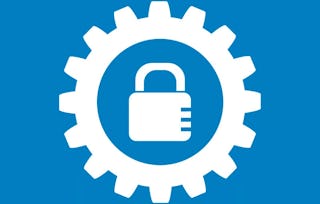Cours 1 - Concepts et pratiques de la sécurité Il s'agit du premier cours de la spécialisation SSCP. Dans ce cours, nous nous concentrerons sur les aspects essentiels des concepts et pratiques de la sécurité, en commençant par l'importance des codes de déontologie. Nous couvrirons ensuite les principes de base de la sécurité de l'information et passerons à la description des contrôles de sécurité, de leur mise en œuvre, de leur maintenance et de leur évaluation. Nous aborderons également l'identification des ressources de l'entreprise et le cycle de vie de la gestion du changement. Nous expliquerons ensuite l'importance de la sensibilisation et de la formation et conclurons par une exploration des opérations de sécurité physique.

Concepts et pratiques de sécurité

Concepts et pratiques de sécurité
Ce cours fait partie de Praticien certifié en sécurité des systèmes (SSCP) de l'ISC2

Instructeur : ISC2 Education & Training
6 433 déjà inscrits
110 avis
Expérience recommandée
Compétences que vous acquerrez
- Catégorie : Intégrité des données
- Catégorie : Sensibilisation à la sécurité
- Catégorie : Contrôles de sécurité
- Catégorie : Sûreté et sécurité
- Catégorie : Contrôle des changements
- Catégorie : Gestion de la sécurité
- Catégorie : Éthique des données
- Catégorie : Cybersécurité
- Catégorie : Politiques de cybersécurité
- Catégorie : Sensibilisation à la sécurité informatique
- Catégorie : Sécurité des données
- Catégorie : Gestion des identités et des accès
- Section Compétences masquée. Affichage de 8 compétence(s) sur 12.
Détails à connaître

Ajouter à votre profil LinkedIn
44 devoirs
Découvrez comment les employés des entreprises prestigieuses maîtrisent des compétences recherchées

Élaborez votre expertise du sujet
- Apprenez de nouveaux concepts auprès d'experts du secteur
- Acquérez une compréhension de base d'un sujet ou d'un outil
- Développez des compétences professionnelles avec des projets pratiques
- Obtenez un certificat professionnel partageable

Il y a un module dans ce cours
Ce cours se concentrera sur les aspects fondamentaux des concepts et des pratiques de sécurité, en commençant par une discussion sur l'importance des codes de déontologie. Nous discuterons ensuite des principes de base de la sécurité de l'information et passerons à la description des contrôles de sécurité, de leur mise en œuvre, de leur maintenance et de leur évaluation. Nous aborderons également l'identification des ressources de l'entreprise ainsi que le cycle de vie de la gestion du changement. Nous expliquerons l'importance de renforcer la sensibilisation et la formation et nous conclurons par une discussion sur la collaboration avec les opérations de sécurité physique.
Inclus
8 vidéos42 lectures44 devoirs
Obtenez un certificat professionnel
Ajoutez ce titre à votre profil LinkedIn, à votre curriculum vitae ou à votre CV. Partagez-le sur les médias sociaux et dans votre évaluation des performances.
Instructeur

Offert par
En savoir plus sur Sécurité
 Statut : Essai gratuit
Statut : Essai gratuit Statut : Essai gratuit
Statut : Essai gratuit Statut : Essai gratuit
Statut : Essai gratuit Statut : Essai gratuit
Statut : Essai gratuit
Pour quelles raisons les étudiants sur Coursera nous choisissent-ils pour leur carrière ?

Felipe M.

Jennifer J.

Larry W.

Chaitanya A.
Avis des étudiants
- 5 stars
80,90 %
- 4 stars
11,81 %
- 3 stars
1,81 %
- 2 stars
2,72 %
- 1 star
2,72 %
Affichage de 3 sur 110
Révisé le 17 avr. 2025
this appears to be a well-structured introductory module covering a significant range of fundamental security knowledge necessary for the field.
Révisé le 15 mars 2025
Some of the answers are incorrect. For example, the purpose of a countermeasure is to what? Answer should be to prevent incident.

Ouvrez de nouvelles portes avec Coursera Plus
Accès illimité à 10,000+ cours de niveau international, projets pratiques et programmes de certification prêts à l'emploi - tous inclus dans votre abonnement.
Faites progresser votre carrière avec un diplôme en ligne
Obtenez un diplôme auprès d’universités de renommée mondiale - 100 % en ligne
Rejoignez plus de 3 400 entreprises mondiales qui ont choisi Coursera pour les affaires
Améliorez les compétences de vos employés pour exceller dans l’économie numérique
Foire Aux Questions
Pour accéder aux supports de cours, aux devoirs et pour obtenir un certificat, vous devez acheter l'expérience de certificat lorsque vous vous inscrivez à un cours. Vous pouvez essayer un essai gratuit ou demander une aide financière. Le cours peut proposer l'option "Cours complet, pas de certificat". Cette option vous permet de consulter tous les supports de cours, de soumettre les évaluations requises et d'obtenir une note finale. Cela signifie également que vous ne pourrez pas acheter un certificat d'expérience.
Lorsque vous vous inscrivez au cours, vous avez accès à tous les cours du certificat et vous obtenez un certificat lorsque vous terminez le travail. Votre certificat électronique sera ajouté à votre page Réalisations - à partir de là, vous pouvez imprimer votre certificat ou l'ajouter à votre profil LinkedIn.
Plus de questions
Aide financière disponible,

